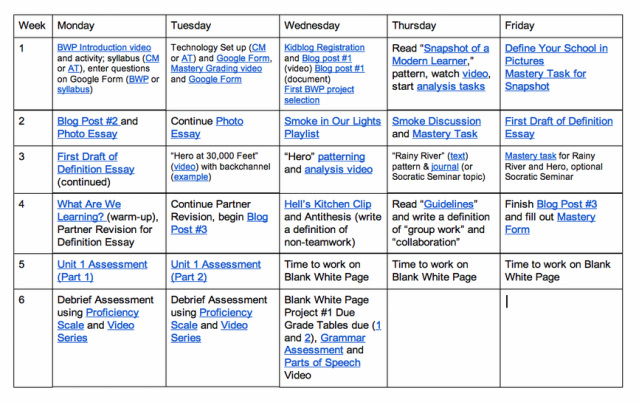We also believe in open source, free materials for teachers. We do not intend to ever sell our materials. We want to give them away for free with the caveat that you give us credit for the work. We, by no means, want to present the material as if we think it's perfect - it's not. There are lots of changes we will make when we teach it next (since we both have new students at the semester, it will be January-February when we teach it again).
But for now, here is the unit - complete with planning documents and links to every assignment, text, grading rubric, and warm-up. If something is listed but doesn't appear, let us know and we'll fix it right away! Almost all of the links are through Mentor Mob, since that's where we store our student playlists.
I hope you find it useful. It's been amazing to plan and teach, and we hope that others can use some of the ideas we have developed here.
Here is the information from the document linked above:
The Master List of Unit 1 Resources
Andrew Thomasson and Cheryl Morris
Planning Documents:
Original Unit Plan (with full assignment descriptions, although a bit different from what we ended up teaching)
Skills Map (Thomasson’s iteration)
Morris’ iterations: 1 2 (Morris modified her maps from the main document)
Playlists:
Weeks 1-3 (Morris)
Weeks 1-2 (Thomasson)
Smoke in Our Lights (both)
Weeks 3-6 (both)
Unit Goals:
- Introducing students to the technical processes they need for the class
- Easing them into the flipped class part - how to watch video, how asynchronous instruction works, how mastery grading works, etc.
- Familiarise them with the patterning strategy and why we use it
- Making inferences based on evidence
- Constructing a definition, both in narrative and informational writing
- Collaborate with peers on a variety of tasks, and differentiate that from doing Group Work.
Essential questions:
- What is a flipped class, and how does OUR flipped class work?
- What goes into a good definition, and how does that differ based on genre and purpose?
- What is the best way to collaborate, and how is that different from cooperative learning/group work?
- What is a pattern and how do those patterns build meaning in a text?
- How do you access meaning beyond the literal/surface level?
Since our classes are asynchronous much of the time, this is mostly a suggested pacing, and is close to our actual pacing. It took Morris six weeks, with about 240 minutes per week (11th-12th graders), and it took Thomasson four and a half weeks, with about 450 minutes per week (10th graders). Please use any resources freely, so long as you give us credit for our work.
Note: the links won't work from this table because it's a picture. Weebly strips the formatting out when I tried to copy and paste from Google Docs. If you want to follow the links, you'll have to open this document.


 RSS Feed
RSS Feed
